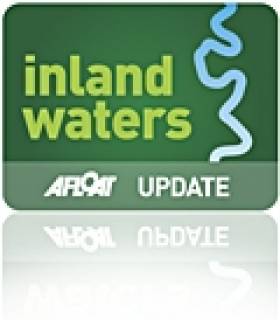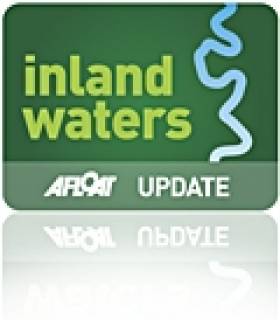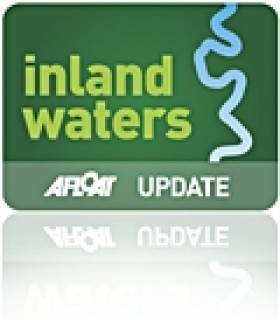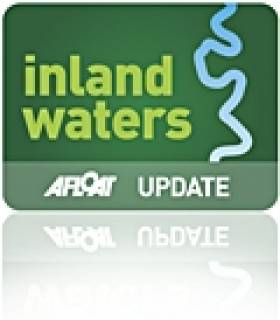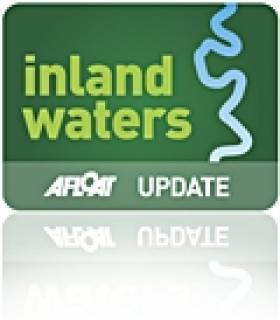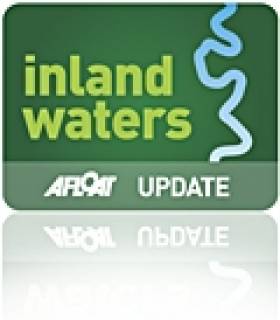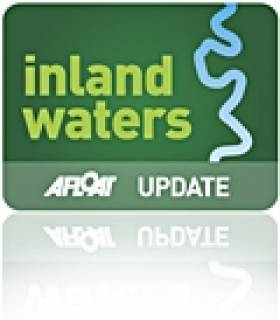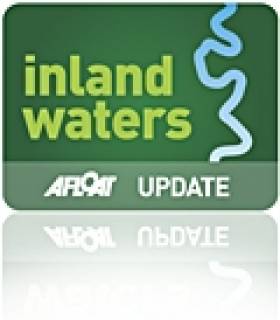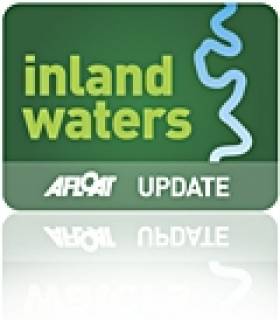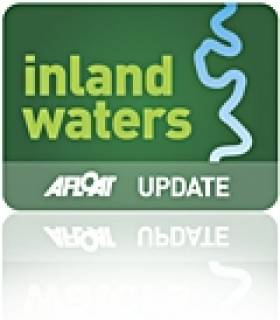Displaying items by tag: Royal Canal
IWAI & The Waterways of Ireland – New Book By Brian Cassells
#inlandwaterways – When English writer LTC Rolt made a round trip from the Shannon to Dublin in 1946, traversing the Grand and Royal Canals, he was considered an eccentric. In the 1940s commercial traffic on the canals and rivers of Ireland had dwindled to almost nothing. Rolt's notion that these waterways could be a source of joy to leisure boaters was considered pure whimsy. But it was the book Rolt published after this trip, Green and Silver, that was to act as inspiration for the formation of the Inland Waterways Association of Ireland (IWAI) in 1954.
There were other catalysts, too, that fired up the Association. The swing bridge at Athlone was to be replaced with a fixed span. The Royal Canal had already fallen into disrepair and was closed to navigation. Dublin Corporation proposed to lay a sewer along the Grand Canal and fill it in to make a road. The IWAI determined to oppose the authorities in their attempts to impede and close the network of waterways.
IWAI and the Waterways of Ireland is a celebration of sixty years of the Association doing just that. It begins with a rattle through the waterways themselves – the many rivers, lakes and canals. A short history of the IWAI follows, interesting as much for the names listed at the inaugural meeting as for what was achieved. Two of these were Colonel Harry Rice, retired from the British Army, and Sean McBride, dedicated Republican, politician and Nobel prize winner. Brian Cassells, writer and compiler of this book, comments 'I smile when I think of a dedicated Republican being best friends with a retired Colonel of the British Army.'
This fact says much about the compelling charm of boating in Ireland – it is a great social leveller. The portraits of people include George O'Brien Kennedy, boat designer; Syd Shine, showband leader; Rosemary Furlong, RNLI fundraiser; Jim McGarry, skipper. A diversity of people who were passionate about the rivers and canals, the boats and buildings.
The backbone of the IWAI remains the branches, and these are covered in full. It is the reasons for their creation, and the progress made, that make these descriptions come alive. How local opinion in Kenagh on the Royal Canal was certain it would never be re-opened (it was). Volunteers working on the Lagan Navigation clocking up 11,000 hours to restore Ireland's only flight of four locks. Coalisland branch members who possessed not a boat between them, dedicated to saving their canalside heritage.
The IWAI still has a campaigning role. There are notable successes in the book, given their own special pages – Ram's Island on Lough Neagh, the Royal Canal, and the Boyne Navigation. There is hope for the restoration of the Ulster Canal.
Brian Cassells has put together a book of immense charm, lusciously produced, rich in photographs. There is some repetition of facts, perhaps inevitable in a book with many different contributors. Nonetheless it is a valuable record of, and insight into, an organisation which has been instrumental in safeguarding a network of waterways that is among the most beautiful in Europe.
Inland Waters Notices: Canoe Polo Nationals, Shannon Boat Rally & Lanesborough Swim Race
#InlandWaters - Masters and owners of vessels on the western end of the Royal Canal are advised of navigation restrictions this weekend (Sat 19 and Sun 20 July) during the National Canoe Polo Championships at Richmond Harbour in Clondra, Co Longford.
Traffic management will also be in place in Athlone during the Shannon Boat Rally between Saturday 26 July and Sunday 3 August, with boats transiting from Lough Ree to Shannonbridge towards Ballinasloe during this period.
Masters should allow extra time for lock passage at Athlone when the rally is moving south due to the large number of vessels expected.
Elsewhere on the Shannon Navigation, an open water swimming race will take place from the Bord na Mona railway bridge, some 3km upstream of Lanesborough, to Lanesborough bridge on the August Bank Holiday (Monday 4 August) from 1.30pm to 4.30pm.
All masters and owners are requested to proceed at slow speed with minimum wash when passing this stretch of the navigation and note any advice given by race stewards and safety boat crew associated with the event.
Minister Opens Royal Canal Path Between Ashtown & Casteknock
#RoyalCanal - The Royal Canal path from Ashtown to Castleknock is the latest section of the ambitious Dublin-Galway coast-to-coast greenway to open, with Transport Minister Leo Varadkar cutting the ribbon on the 2.5km stretch today at the 12th Lock (Friday 27 June).
The €2 million section across West Dublin is intended to be valuable local amenity for walkers, cyclists and other local residents - but it will also form part of the first national greenway running right across the country, from the Dublin Docklands to the Atlantic coast in Galway.
In addition, Minister Varadkar announced details of the preferred route for the western section of the greenway between Athlone and Galway, running through Shannonbridge, Loughrea, Craughwell, Clarinbridge and Oranmore to the Galway coast.
“It’s great to see the Galway to Dublin Greenway taking shape," he said. "Two years ago we only had a simple idea to run a greenway along the Royal Canal. Now three sections are open to the public and being used actively by walkers, cyclists and for other leisure pursuits."
The minister elaborated on the "incremental approach" for the greenway project, developing sections as funding becomes available.
"Although we still have a huge task in finishing the rest of the project, I’m really looking forward to walking, cycling or running along the entire route between Dublin and Galway when it’s finally completed.”
Opened so far, along with the Ashtown-Castleknock path, are the section from Guild Street to Sherriff Street in Dublin's Docklands, and a 25km route in Westmeath from Mullingar to the Meath border.
A 40km section between Mullingar and Athlone will be completed next year, after €4 million was allocated by Minister of State for Transport Alan Kelly. Two further sections totalling 40km in Kildare and Meath are at shovel-ready stage and work will start as soon as funding becomes available.
Boating Traffic on the Grand & Royal Canals & River Barrow to be Impacted By Bye–Laws – IWAI
Carmel Meegan, President of the Inland Waterways Association of Ireland (IWAI) welcomed delegates to the IWAI National Council meeting in Tullamore on 8th confirmed that the proposed bye-laws do not put user requirements, local communities or tourism at the centre of the regulations. Delegates heard –
In general –
there are reports that boats present this time last year have now left the Canals – the IWAI says this is indicative of boaters' fears and a further future drop in navigation use
Waterways Ireland have suggested that the 1800 plus submissions delivered by IWAI - during the brief consultation period of only 21 days- are letters in support of the IWAI
Submission rather than viewing these as other individual submissions recognising the effort and concern held by wider communities
Waterways Ireland imposed restrictions never previously invoked on boats travelling by Canal to the Dublin Rally in 2014 – which is celebrating 40 years of community activity
the proposed toll €75 to travel between the Grand and Royal Canals is detrimental – the IWAI advises this is the now most expensive boat crossing in Europe
the Newcomen lifting bridge will open only 8 times this year, only 96 boats are permitted to undertake the Green & Silver route around the Grand and Royal Canals this season due to restrictions of use of the Newcomen lifting bridge, significantly curtailing the emerging 'Green & Silver' route – the IWAI advises this is a major miss for domestic and international boat tourism.
Concerns aired as to the Canals and Barrow as a tourism resource have included questions in the Seanad and the Dail; County Council input; national and local press articles; television and radio interviews; community websites; blogs and Facebook pages reflecting overall national concern.
Politically, this has grown to be a very big issue and is featuring highly as politicians face into local elections this summer. The IWAI have gained the interest of local, regional and national
politicians on this matter to date, and will present our position to the Oireachtas Joint Committee on the Environment, Culture and the Gaeltacht in Leinster House on 25th
The boating community is not averse to appropriate management, facility provision, and access to waterways. But boats are key attractions, as the lifeblood of the navigations, and need to be welcomed.
Fallen Tree Blocks Royal Canal's Richmond Harbour
MARINE NOTICE
No 4 of 2014
Shannon Navigation & Royal Canal
Clondara / Richmond Harbour
Waterways Ireland wishes to advise masters that a large tree has fallen across the navigation and is presently obstructing the entrance to Richmond Harbour and the Camlin jetties.
A further marine notice will issue when the navigation has been cleared.
#byelaws – Waterways Ireland invites people and organisations affected by the changes to the Draft Canals Act, 1986(Amendment) Bye-Laws, 2014 to make submissions to Waterways Ireland before the 3rd February 2014.
All the documents are available online and can be viewed by arrangement in Waterways Ireland offices in Enniskillen and Dublin. Submissions can be made online, by email, by post and by visiting Waterways Ireland offices.
Submissions are being sought on changes to the Bye-Laws on the Grand Canal, Royal Canal and Barrow Navigation. The Draft Canals Act, 1986(Amendment), Bye-Laws, 2014 includes a new management framework which will be used to manage continuous cruising, houseboats, dry dock facilities as well as key location & serviced mooring usage. The amendments also include changes to mooring times, charges and the introduction of a fixed penalty notice.
Waterways Ireland will consult with the groups representing the views of people affected by statutory equality regulations such as disability or age based groups. In addition Waterways Ireland will be holding meetings with groups where their members will be affected by the changes to the Bye-Laws. Letters have also been issued to all permit holders on the navigations affected by the Bye-Law changes informing them of the public consultation and the availability of the documentation.
The period for submissions is set by the Section 7(1) of the Canals Act, 1986 (No.3 of 1986) as amended by section 56 of the Maritime Safety Act, 2005 (No. 11 of 2005). The deadline for submissions is the 3rd February 2014. Documentation is available from www.waterwaysireland.org/Public-Consultation or from Waterways Ireland offices as listed.
Grand, Royal Canals & Barrow Navigation Planned Closures
MARINE NOTICE
No 130 of 2013
GRAND, ROYAL CANALS AND BARROW NAVIGATION PLANNED WINTER CLOSURES
2013-2014
Waterways Ireland wishes to advise Masters and owners of vessels that the following planned closures will be in place for the winter of 2013-2014.
Grand Canal – Main Line
Circular Line, Dublin The Circular Line of the Grand Canal is closed to navigation between Lock C3 (Upper Mount Street) and Lock C5 (Leeson Street) from October to December 2013 to facilitate the installation of new lock gates.
Ardclough, Co. Kildare The Grand Canal is closed to navigation on the 13 th Level, downstream of Ponsonby Bridge near Ardclough, Co. Kildare, from November 2013 to February 2014 to facilitate works by Kildare County Council associated with the construction of a new distribution watermain.
Sallins, Co. Kildare The public moorings immediately East and West of Sallins Bridge are closed until mid-March 2014 to facilitate the construction of new houseboat and public jetty facilities.
Ballycommon to Clonony,
Co. Offaly The Grand Canal is closed between the 34 th Lock at Clonony and the 21 st Lock at Ballycommon from Monday 4 th November until Friday 20 th December 2013 to facilitate maintenance works.
Grand Canal – Barrow Line
Vicarstown, Co. Laois Possible closure of the canal in the Vicarstown area to facilitate bridge repairs – further details to follow.
Royal Canal
Spencer Dock,
Newcomen Bridge There will be no further lifts of Newcomen railway bridge until the 2014 boating season.
Ashtown to Castleknock,
Dublin 15 The towpath of the Royal Canal between Ashtown (10 th Lock) and Castleknock (12 th Lock) is closed from October 2013 to February 2014, to facilitate the construction of new cycle path facilities. An alternative route for towpath users will be sign-posted.
41 st Level, Mosstown,
Co. Longford The Royal Canal is closed at Mosstown until further notice due to a collapsed culvert.
Barrow Navigation No closures are planned.
Charles Lawn
Lt Cdr(rtd)
Inspector of Navigation
21 November 2013
Tel: 353 90 6494232
Fax: 353 90 6494147
MARINE NOTICE
No. 97 of 2013
Royal Canal - Dublin
Towpath Closure
Level 1 – Binns Bridge to Russell St
Waterways Ireland wishes to advise that the above section of canal towpath on Level 1 of the Royal Canal Dublin has been closed to the public due to a wall slippage that occurred following heavy rainfall on Wednesday night.
Electrical and gas services run along the towpath so it has been closed as a precautionary measure until repairs are carried out. However, navigation will remain open as normal throughout this period.
Waterways Ireland apologises to its customers for any inconvenience caused.
C. Lawn
Inspector of Navigation
28 Jul 2013
Tel: 00353906494232
Fax:003539094147
#InlandWaterways - Waterways Ireland has advised all masters and users of the Erne system that the channel east of Castle Island near Enniskillen will be closed till Tuesday 11 June to facilitate a number of events on the water.
Mariners are directed to follow the marked navigation channel and signs to the west of Castle Island and proceed at a slow speed and with minimum wash. They should note any advise or instructions given by event organisers when in this section of the navigation.
Public jetties in the vicinity will remain accessible throughout, though some minor restrictions may be in place as and when required. Further information is available from the Lough Erne warden at 028 6632 3004.
Elsewhere, there will also be restricted mooring for masters and owners on the River Shannon at Carrick-on-Shannon to facilitate spectator viewing of the Carrick 400 event.
On Sunday 2 June the quay wall from the downstream face of the town bridge to the floating moorings will be out of bounds for mooring from 7pm till midnight.
In other waterways news, recent water quality testing has shown the harbour at Kilcock on the Royal Canal to now be within normal bathing water standards.
Water Patrollers For Royal Canal From Kilcock To Dublin
#InlandWaterways - Waterways Ireland advises that water control and boat assistance on the Royal Canal from Lock No 12 to 17 between Kilcock and Dublin (Castleknock) over the summer period will be provided by a full-time Water Patroller with assistance on weekends.
Des Phillips (contact 087 248 5754) will be on duty Monday to Friday from 8.30am till 5pm and on Sundays from 8.30am till 12.30pm.
PJ Massey (contact 087 985 7019) will provide water control and boat assistance on Saturdays from 8.30am till 12.30pm.
On Saturday and Sunday afternoons from 2pm till 6pm, cover will be provided by either Damien McDermott, JJ Brennan or David Whelehan (contact 087 177 8563).
Note that passage through Locks No 16 and 17 may not be possible outside of the hours listed above. Masters should therefore contact the relevant water patroller to arrange assistance through these locks.



























